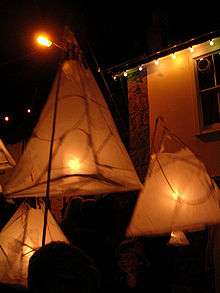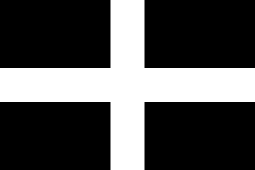Tom Bawcock's Eve

Tom Bawcock's Eve is an annual festival, held on 23 December, in Mousehole, Cornwall, England.
The festival is held in celebration and memorial of the efforts of legendary Mousehole resident Tom Bawcock to lift a famine from the village by going out to fish in a severe storm. During this festival Stargazy pie (a mixed fish, egg and potato pie with protruding fish heads) is eaten and depending on the year of celebration a lantern procession takes place.
Origins
There are several theories of the origins of this festival, but the first recorded description was made by Robert Morton Nance in 1927 in the magazine Old Cornwall. Nance described the festival as it existed around the start of the 20th century. Within this work Nance also speculated that the name Bawcock was derived from Beau Coq (French) - he believed the cock was a herald of new light in Pagan times and the origins of the festival were pre-Christian. The most likely derivation of the name 'Bawcock' is from Middle English use (influenced by French) where a Bawcock is a nickname for a fine or worthy fellow. An example of such use can be found in Shakespeare's Twelfth Night Act 3. Scene 4: "Why, how now, my bawcock!" As the name Tom was often used as a generic description for any man it is likely that Tom Bawcock was a symbolic name for 'any fine fellow' who risked his life in pursuit of fishing. Midwinter celebrations were also common in one of Cornwall's other principal traditional occupations mining. Picrous Day and Chewidden Thursday seem to have similar origins to Tom Bawcock's Eve.
The Mousehole Cat
The children's book The Mousehole Cat by Antonia Barber was inspired by the traditions and practice of Tom Bawcock's Eve and resulted in a television production of the same name. (Ms Barber lists Star-Gazy Pie as a staple of Mousehole diet before Tom's heroic fishing expedition, however, whereas according to tradition it dates from his return and legendary catch.)
Folk music traditions
There is an ongoing folk music tradition associated with Tom Bawcock's Eve. The words were written by Robert Morton Nance in 1927, to a traditional local tune called the 'Wedding March'. It is believed that Nance first observed the festivities around the start of the 20th century. His version runs as follows:
Merry place you may believe, tiz Mouzel 'pon Tom Bawcock's eve.
To be there then who wouldn't wesh, to sup o' sibm soorts o' fish.
When morgy brath had cleared the path, Comed lances for a fry,
And then us had a bit o' scad an' Starry-gazie pie.
As aich we'd clunk, E's health we drunk, in bumpers bremmen high,
And when up caame Tom Bawcock's name, We'd prais'd 'un to the sky.[1]
- ^ "Tom Bawcock's Eve". CooksInfo.com. 11 June 2009. Retrieved 24 December 2013.
The song appears on four of the albums by Cornish singer Brenda Wootton: Piper's Folk (1968), Starry Gazey Pie (1975), Way Down to Lamorna (1984) and Voice of Cornwall (1996).[1]
See also
References and external links
- Sample Stargazy Pie at Tom Bawcock’s Eve in Mousehole (Eyewitness account of the celebration)
- ↑ "Brenda Wootton: Complete Discography". Brendawootton.eu. Retrieved 26 October 2015.
